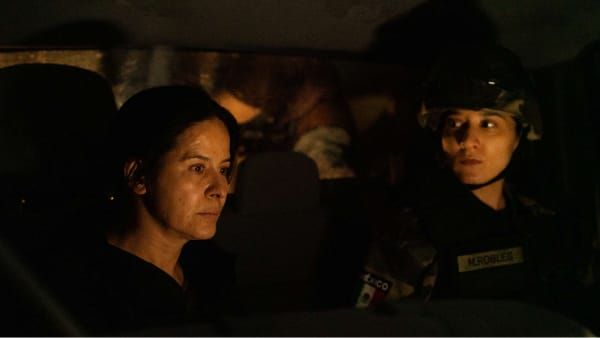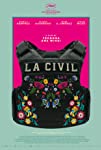Eye For Film >> Movies >> La Civil (2021) Film Review
La Civil
Reviewed by: Andrew Robertson

Adam says "We're naked, homeless, unemployed and penniless, and they keep telling us we are in Paradise". He tells Eve he knows where they are. "This must be Mexico."
Laura tells that joke to her mother. It's one of the last things we see her say, reading from her phone in the half light of going out. The chameleon hasn't been fed. She'll do it later.
Laurita won't come back that evening, but we don't know that. Not when her mother goes out in her anonymous silver Chrysler sedan, waiting at a junction behind the Army in their ominous pickups. Those welded cages at the back aren't improvised. They allow soldiers of the occupying army to stand and surveil and shoot while their officers and specialists ride in crew cab comfort. The Romans did that too in their Empire, not the Japanese engineered utility vehicles, the garrisons from further afield. We'll get to that.
As do the cartel. Within the first ten minutes our course is set when Cielo, Laura's mother, is pulled over by a gangster. They say to meet them ten minutes hence, and there lay out what is to happen. They take the food from her plate and say they want 150,000 pesos, the black pickup truck her husband drives. That's about £5,500 right now, the truck, depending on condition, anywhere up to ten times that. It's a Ford, 'built tough' is the slogan. Not as tough as Cielo.
It is hard to credit that this is director Teodora Mihai's first feature, so too that it is a début for her co-writer Habacuc Antonio De Rosario. In the first 20 minutes it sets out everything we need to know and then plunges us in a pace that feels at once headlong and glacial in its coldness through Cielo's attempts to get her daughter back. There are two hours more but they are not felt, so finely is this crafted.
I was minded of Apocalypse Now, not just in its aspect of war reduced to a succession of horrors nor in scenes whose sweep conceals the efforts that went into them, but in the sense of an almost religious progress. A set of deepening steps, further towards a heart of darkness, the coldness of Judecca. Three faces of the Emperor of that dolorous kingdom, the cartels, the police, the army.
Arcelia Ramirez is an acting veteran, more than a hundred roles. She's astonishing from first scene to last, so much in movement, gesture. Showing at Glasgow's 2022 Film Festival in a programme that includes Mark Rylan cut The Outfit it's another showcase of actorly talent, for every beefy bit of Bat-bombast or method abnegation that gets attention it is in the still and small and significant that we should be looking.
Marius Panduru's camera (and the grading in native Romania) give this a feel that's close to vérité. This one of two 2021 features, the other the wildly tonally different but no less stunning Bad Luck Banging Or Loony Porn. Here the long shots that track what must be rehearsed movements through doors and down corridors and through chambers of horrors and walking pace car chases and violences done off screen and consequences seen on screen all contribute to something on the edge of documentary.
There are practical effects, makeup, injury detail, gunshots, but they never break focus because this is a film that immerses, inters, interrogates. Steeped in the biblical, in quantities religious, extended sequences that feel lyric. We look heavenward once, a shot of skies like those over the Chihuahua of Silent Light, not as long, not emerging from darkness, but no less contemplative.
There's a point where the subtitles read "god damn it" but in a conversation between two mothers what's actually said is "chingada madre". Not quite "yer maw", [your] fucking mother, a son of a bitch but different. I mention it in part because it is one of the elements that informs Octavio Paz' essay El Laberinto De La Soledad", later editions of which add a section on the Tlatelolco massacre. Even without it the work is full of musings on death, the eponymous solitude, the fear of each.
It is easy enough to draw comparisons with things like Sicario but those are 'of' and not 'within', even embedded they have ways out of it all. I mention Dante and Conrad because this is a transformative journey, not just a revelatory one. I was lost within the film, to the point that I was discomfited by the presence of music credits. Something that I did not notice being there, like the absence of Schifrin in that chase in Bullitt. So caught up in an intensity of light and its associated darkness that any other sense was fleeting.
This is a film full of stories, based, at some remove, on true ones. There is a parable of a pueblo which had a difficult corner, a lesson in why vigilantes wear masks, sheets as shrouds, candles and other burning. In Children Of Men an extended sequence runs through a building in the middle of a battle, and though at the time you are captivated in recollection it is the effort to make it happen that it gains something extra. This is a considered film, a triumph, there are few like it and more's the pity.
Those long scenes replace concision with elision and when one can only hear proceedings, the mind's eye tends to the visceral. We see what's happening behind in these arc shots, around, but even as the camera moves it grounds us. Ramirez' Cielo is not alone, there's her (ex) husband, his mistress, a new lieutenant, Laura's boyfriend, the gangsters themselves, the mortician, Commander Inez, the shopkeepers, neighbours, that chameleon.
Changing as the environment changes. Not just autonomically, on the outside, inside, deeper, darker. It means 'the civilian', the title, give or take. It does not mean 'non-combatant', it does not mean 'innocent', it does not mean little as a noun in the rules of war and as an adjective it has a power that this film carries too.
Reviewed on: 10 Mar 2022















